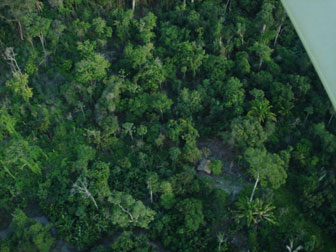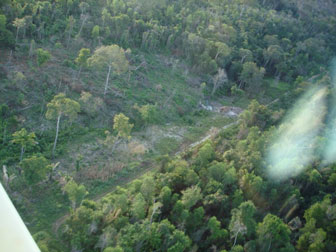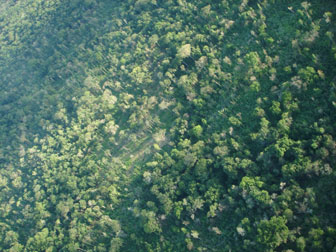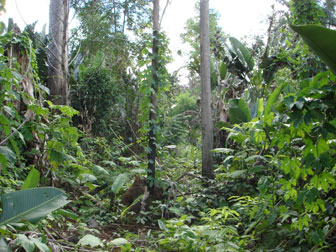Land invasions are undermining a Brazilian law that requires ranchers to keep 80 percent of their land forested, according to reports from the Amazon state of Mato Grosso. A run up in land prices, driven by surging soy and cattle production in the region, combined with a lackadaisical response from law enforcement authorities are blamed for the incursions.
John Cain Carter, a rancher featured in Time Magazine last week and founder of a movement to promote conservation among commodity producers in the Amazon, says that squatters backed by the big guys, have invaded his reserva legal — the government-mandated rainforest easement. Much of the forest area was damaged by fires set by the squatters in a neighboring pasture last year.
“My neighbor’s 25,000 hectares [62,000 acres] of forest reserve was first invaded, instigated by the same corrupt network,” he told mongabay.com. “That problem has trickled over to us.”

|
“Poor squatters as used cannon fodder,” he continued. “They are paid to occupy the land so some big guy can eventually claim it and then sell it. By the time the authorities look into it, the backer has long moved on, taking his money with him.”
Carter says his appeals to local authorities have been wasted.
“I have been alerting the authorities for months to no avail. The squatters are heavily armed and the few Federal Policemen who came to investigate would not go in to the forest,” he said. “During that time the squatters have been systematically cutting down the forest and planting grass, to the extent of even using crop dusters to seed. It is a very dangerous situation. Truly, there is little law, mostly related to a lack of political will.”
Beyond losing the forest reserve he has fought to protect, Carter now runs the risk of running afoul of the law that requires him to keep 80 percent of his land forested. Though rarely enforced, Carter’s conservation efforts are based on closely following the forest reserve requirements.
“The government can fine me,” Carter said. “The problem, the irony, is that the government demands we maintain our forest reserve yet offer zero support when property rights are challenged. That is one of the main drivers to deforest, to maintain property rights. Squatters don’t invade pasture.”
Carter has held title to his land for a dozen years, but in a region where speculation is rampant due to fast-appreciating prices, little is safe from squatters, who are often used as a proxy by development interests to gain control of land. With archaic land titling processes, irregular law enforcement, and rampant corruption at the state level, it is difficult to distinguish legitimate owners of land from illegitimate ones. A “Wild West” mentality prevails and violence is common in both Mato Grosso and Para, the states at the heart of Brazil’s fast expanding agricultural frontier. Several times over the past few years — including in the aftermath of the murder of American nun Dorothy Stang and a recent uprising in Tailandia — the federal government has had to send in the army to quell dangerously escalating situations.

|
Lack of local government has forced Carter to turn to federal authorities — Wednesday he flew to Brasilia to discuss the situation with a senator. Less prominent landowners don’t have that option.
Still Carter is hopeful that the tide can someday be turned by converting Brazil’s strict forest laws into a marketing advantage for ranchers. Through Aliança da Terra, his nonprofit, Carter aims to use a certification system to take the place of a failed governance regime.
“We want market recognition for shouldering this conservation burden. Where else in the world do you have landowners who have to keep 50 percent of their land forest? Nowhere. As it is right now there’s nothing to keep forest standing because the law doesn’t catch you in time and you can always bribe your way out of it if you do get caught.”
“We’re trying to turn this forest reserve law from a negative into a positive,” he continued. “People think farmers in the Amazon are bandits so we’re trying to show there are good people who are trying to make a difference and reduce their impact… We’re turning the system on its head, adding transparency and credibility to turn it into a worldwide example of good land stewardship. Producers will be rewarded through market acceptance for taking the extra steps to do the right thing. They’ll be able to take their product to McDonalds, Burger King, and other firms worried about reputations. All the big multinationals want credibility these days in regards to the environment and sustainability… We offer consumers confidence instilled by the involvement of impeccable organizations like the Woods Hole Research Institute and researchers from Yale, Stanford, the University of São Paulo and NASA. We have some of the top naturalists and environmental scientists in the Amazon involved with this.”
Such certification efforts could help improve the environmental performance of commodity producers in the Amazon, but until something resembling the rule of law is established, Carter and other landowners will likely face these problems again and again.
Previous articles mentioning John Carter
- Can cattle ranchers and soy farmers save the Amazon rainforest?
- Saving the Amazon Rainforest Through Agricultural Certification
- Dutch bank arranges Amazon rainforest carbon-conservation deal
- Brazil cracks down on illegal soy, cattle production in the Amazon
- Amazon rainforest fires “worst” in memory
- Globalization could save the Amazon rainforest
- 2007 Amazon fires among worst ever
- Photos: Fires rage in Amazon rainforest park
- Cheap cattle loans may be driving surge in Amazon deforestation
Names have been omitted in this article due to safety concerns.

